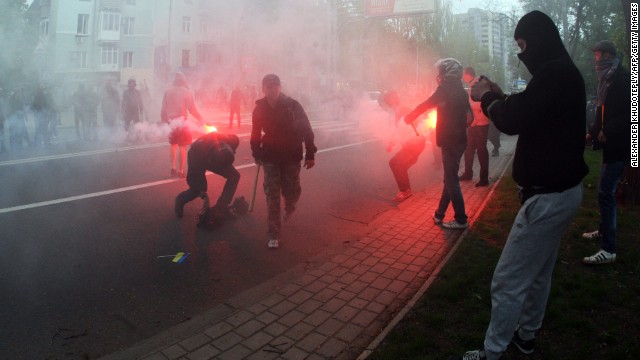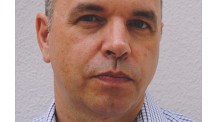Ukraine crisis: Who will blink first, Vladimir Putin or the West?
April 28, 2014
Editor's note: Ulrich Speck is a visiting scholar at the Carnegie Europe think tank in Brussels. The opinions expressed in this commentary are solely his. Follow @uli_speck and @Carnegie_Europe on Twitter.
(CNN) -- Russia's seizure of Crimea last month may
have unfolded with a lightning quickness, but Vladimir Putin and the
West are now engaged in a much slower match of wits on a chessboard
stretching across most of eastern Ukraine.
Rather than going for
checkmate, both sides now seem content to wait for the other to make a
mistake. Putin made a strong first move by placing 40,000 troops on the
border -- and separatists, who are not officially linked to Russia, on
the ground in Ukraine.
Now Moscow is waiting for
the pro-Western government in Kiev to try to retake the parts of the
east it has seemingly lost. In Russia's eyes, any such move from the
capital would legitimize an overwhelming counterattack -- a re-run of
the Georgia crisis in 2008, when President Mikheil Saakashvili lost his
nerve, shot first, and prompted a Russian invasion.

Ulrich Speck
Putin's problem is time;
he cannot wait forever to strike. Troops cannot remain ready for combat
for many months at a time. Separatists in eastern Ukraine are lost
without outside support, and may become nervous as time drags on without
any glimpse of a light at the end of the tunnel.
On the other side of the
board are U.S. President Barack Obama, German Chancellor Angela Merkel
and Ukraine's fledgling government. The biggest challenge for Obama and
his German counterpart is to keep a united Western front. They need to
uphold a credible threat of massive economic sanctions that could
undercut the Kremlin's funding if it doesn't toe the line
But cracks in Western
unity are visible everywhere. Europe may be concerned about Russian
aggression in Ukraine, but the continent is dragging its collective feet
on taking a more confrontational stance towards Putin.
Some nations fear Russian
pressure, especially on their energy supply. Many are nervous about the
price their own countries will pay as a result of tougher sanctions.
And nobody is sure yet whether they're ready to abandon the idea of
Russia as a vital partner.
Obama, on the other hand,
is much more inclined to put the squeeze on the Kremlin. Washington is
used to confrontation with Russia -- and with Putin, specifically -- and
America is much less economically-connected with its old Cold War
rival.
American leaders aren't
motivated solely by their concern over eastern Europe and Russia
reasserting itself as a more aggressive and expansionist power. The U.S.
also wants to assert key norms of international order -- namely
territorial integrity and the principle to change borders only with the
consent of all parties.
Ukraine is also a
welcome opportunity to signal to allies and rivals alike that America is
not retrenching from its global engagements. The impact of the Ukraine
crisis on China and the various territorial conflicts with its neighbors
will also loom very large on the minds of policy makers in Washington.
But whatever the
differences among U.S. and EU leaders, the more they act in concert, the
better chance they have to achieve their goal: beating back Moscow's
attempt to undermine Ukraine's sovereignty and territorial integrity.
The West also needs to
make sure that Kiev's interim government doesn't lose its nerve. As hard
as it is for leaders to watch pro-Russian separatists take over their
buildings, any large-scale operation in eastern Ukraine could give Putin
the opportunity he may be waiting for: invasion with some kind of
dubious pseudo-legal cover.
It is difficult to say
who is in a better position. Putin is a master tactician. Since his
years as a KGB agent in Dresden in the 1980s, he has gained much
expertise in finding and exploiting the West's weak spots. And he seems
to have broad support at home for his confrontational brand of politics.
................continues
more see CNN http://edition.cnn.com/2014/04/28/opinion/ukraine-putin-west-chess/
No comments:
Post a Comment